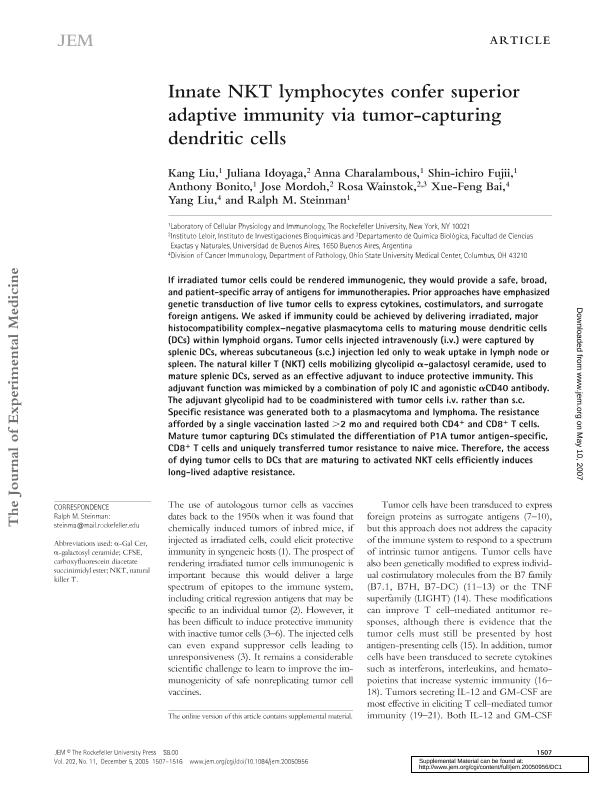Artículo
Innate NKT lymphocytes confer superior adaptive immunity via tumor-capturing dendritic cells
Liu, Kang; Idoyaga, Juliana; Charalambous, Anna; Fujii, Shin Ichiro; Bonito, Anthony; Mordoh, Jose ; Wainstok, Rosa
; Wainstok, Rosa ; Bai, Xue Feng; Liu, Yang; Steinman, Ralph M.
; Bai, Xue Feng; Liu, Yang; Steinman, Ralph M.
 ; Wainstok, Rosa
; Wainstok, Rosa ; Bai, Xue Feng; Liu, Yang; Steinman, Ralph M.
; Bai, Xue Feng; Liu, Yang; Steinman, Ralph M.
Fecha de publicación:
12/2005
Editorial:
Rockefeller University Press
Revista:
Journal Of Experimental Medicine
ISSN:
0022-1007
e-ISSN:
1540-9538
Idioma:
Inglés
Tipo de recurso:
Artículo publicado
Clasificación temática:
Resumen
If irradiated tumor cells could be rendered immunogenic, they would provide a safe, broad, and patient-specific array of antigens for immunotherapies. Prior approaches have emphasized genetic transduction of live tumor cells to express cytokines, costimulators, and surrogate foreign antigens. We asked if immunity could be achieved by delivering irradiated, major histocompatibility complex-negative plasmacytoma cells to maturing mouse dendritic cells (DCs) within lymphoid organs. Tumor cells injected intravenously (i.v.) were captured by splenic DCs, whereas subcutaneous (s.c.) injection led only to weak uptake in lymph node or spleen. The natural killer T (NKT) cells mobilizing glycolipid α-galactosyl ceramide, used to mature splenic DCs, served as an effective adjuvant to induce protective immunity. This adjuvant function was mimicked by a combination of poly IC and agonistic αCD40 antibody. The adjuvant glycolipid had to be coadministered with tumor cells i.v. rather than s.c. Specific resistance was generated both to a plasmacytoma and lymphoma. The resistance afforded by a single vaccination lasted >2 mo and required both CD4+ and CD8+ T cells. Mature tumor capturing DCs stimulated the differentiation of P1A tumor antigen-specific, CD8+ T cells and uniquely transferred tumor resistance to naive mice. Therefore, the access of dying tumor cells to DCs that are maturing to activated NKT cells efficiently induces long-lived adaptive resistance.
Palabras clave:
Dendritic Cells
,
Immunity
,
Tumors
Archivos asociados
Licencia
Identificadores
Colecciones
Articulos(IIBBA)
Articulos de INST.DE INVEST.BIOQUIMICAS DE BS.AS(I)
Articulos de INST.DE INVEST.BIOQUIMICAS DE BS.AS(I)
Citación
Liu, Kang; Idoyaga, Juliana; Charalambous, Anna; Fujii, Shin Ichiro; Bonito, Anthony; et al.; Innate NKT lymphocytes confer superior adaptive immunity via tumor-capturing dendritic cells; Rockefeller University Press; Journal Of Experimental Medicine; 202; 11; 12-2005; 1507-1516
Compartir
Altmétricas



